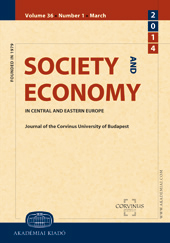Poland and Slovakia during the economic crisis 2008–2010
Poland and Slovakia during the economic crisis 2008–2010
Author(s): Krzysztof BandaszSubject(s): Supranational / Global Economy, Economic history, Economic policy, Economic development, Financial Markets
Published by: Akadémiai Kiadó
Keywords: economic crisis; exchange rate; euro;
Summary/Abstract: This article examines the impact of different exchange rate regimes on economic conditions during an external economic shock. It focuses on the recent global recession of 2008 and analyses its impact on two emerging market economies: Poland and Slovakia. These countries share many similarities, such as location, main trading partners and the general level of development. However, they differ significantly in the size of their economies and economic openness. They adopted radically different currency arrangements as well, which determined the way their economies were influenced by the economic turmoil. The article examines the role of foreign loans and the export structure as potential factors influencing the Slovak and Polish economies. Several economic indicators are analysed and compared, including trade balance, inflation, conditions in the tourism sector and credibility with the investor community. The paper argues that Poland substantially benefited from its monetary autonomy and the depreciation of the Polish Zloty. The weaker currency triggered a significant expenditure switching effect and improved the balance of trade. The membership in the Euro-zone had a blurred impact on Slovakia, it increased stability and credibility, however, it did not allow nominal adjustments to cushion the real economy.
Journal: Society and Economy. In Central and Eastern Europe ǀ Journal of the Corvinus University of Budapest
- Issue Year: 35/2013
- Issue No: 2
- Page Range: 141-165
- Page Count: 25
- Language: English

